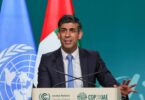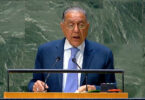F.P. Report
BERLIN: Foreign Minister of Germany Heiko Maas has said that we are delighted to have the opportunity to not only talk to those people we tend to meet regularly – ministers, politicians – but to meet with people like you.
This he said while addressing to a event, FM Maas said that we are willing to take any questions you might have. I really enjoy something like this, especially as the perspective of us being given a glass of beer is there visible on the horizon. Why are you giving me a large one? Bad news, bad press coverage. And that this takes place in a location like this – those who know Berlin know Clarchens Ballhaus, and I am pleased that Tony accepted to have this here. This is not the classical Berlin style.
So as I said, we look forward to having your questions. And I don’t want to be too long. I’ll just share a story with you, if I may, Tony. From the very first telephone conversation we had after Tony took the office of Secretary of State, at the end of the telephone call I couldn’t help myself by saying Tony, I still have to get used to the fact that I can speak to the American Foreign Secretary and always be of the same view because that used to be different beforehand.
This is important for the bilateral relationship between Germany and the United States. The election of Joe Biden is a genuine game-changer for international politics, the biggest for quite a while – for many years indeed as long as I have been following events in the field of foreign policy because you once said diplomacy is back, and I think the President also said that diplomacy is back, the United States are back on the international stage. And that is really something that we missed for quite a while – transatlantic partnership, yes, indeed.
I think we have to have the same objectives, and that has improved as far as that situation is concerned. And I think this is to do with the fact that we are linked by the same values. We share the same values: democracy, freedom, rule of law. And I believe that that is what the vast majority of the people on this globe actually wants to have as the foundation of their lives, and that is what links us. I think that is what brings us together and what we have in common, Europe and North America. And the times we are experiencing is the place to be.
Okay, let me give you one example, a somewhat problematic one. When we look to the flows of migration we are confronted with, the people who want to come to Europe, why do they want to come to Europe? I know about few people – migrants who are heading in the direction of China or Moscow. They’re coming to us. And the same is true for the United States when you look to Latin America – South America – they are heading in your direction, your way, and towards Canada. And that is a clear indication of the fact that this is what the people are looking for: democracy, liberal societies, freedoms, and respect for the rights of minorities too. These are the values that we share.
And if you share that set of values, it’s not that difficult also to define the same objectives. And it is now about how we can cooperate in order to achieve these objectives. And we are cooperating. In the past, this hasn’t been the case often enough when you look to Russia and to China. We won’t be able to achieve as much as we would if the United States and Europe were to pursue the same strategy; we would be playing in the same camp, so to speak. And that is or has become obvious over the last few months – the same objectives, the same set of values.
And every – whenever this cooperation takes place, G7, G20, we are heading for a G20 ministerial meeting at the end of – at the beginning of next week – we’ll have to unite our forces in order to protect what is important to us, the values that – our foundation and our political sphere, but also those that we want to have as a foundation for our everyday life. They need to be protected and to be upheld day in, day out. And if that is possible, I think then it should be possible also to make sure that they are upheld in other parts of the world too.
So as I said, I’m delighted that we’re back here. We need the United States. And yeah, I want to be quite open because it sounds so political what I’ve been saying so far. It’s more fun too. I’m being very honest. We had President Trump, then we had the virus. It has made matters extremely complicated. I now hope that we will overcome the virus too. We have so many things in common. And I think there is such a great degree of readiness and willingness on both sides of the Atlantic to cooperate. So I look forward to that.
Minister, thank you very much indeed. (Applause.)
US Secretary of State Anthony J. Blinken also spoke on the occasion and he said that well, first, it’s wonderful to be with all of you. And I’ve got to say, Heiko, as much as I love the foreign ministry and as much as the chancellor’s office is extraordinary, this is a pretty good place to have a conversation. And I asked for the smaller one.
Blinken said that I have a deep personal affection for Germany that goes back many years. I had the great experience and good fortune after being born in New York and living in New York until I was nine years old and moving when I was nine to Paris, and my closest friends in school in Paris were both, as it turned out, German – both when I first got there when I was nine, ten years old, and then later another good friend who was my closest friend through high school. And we were in a band together. He was actually talented, unlike me. (Laughter.) But we – one spring break we took a road trip, and we drove from Paris to Hamburg, and we – maybe we thought we were going to be like the Beatles when they spent time in Hamburg and then they got famous afterward. That didn’t happen.
But I have wonderful memories of getting to Hamburg. And it was a holiday weekend, and we were at a place not unlike this in Hamburg, and the band that was supposed to play that weekend was unable to do it, and it was a holiday weekend. And my friend said, well, we’re a band, and they said oh, all right, come back tomorrow and play a few songs, and if you’re even – if you’re any good, we’ll let you play over the holiday weekend. And we had another member of the band with us on this road trip, and we met up with a couple of my German friends – his name was Carsten Gerlach – Carsten’s friends who lived – were still living in Hamburg, who were actually very good musicians. We practiced all morning, went to the bar at night, the late afternoon, played a few songs. They said, well, not great but it’s better than having no band. (Laughter.) And we played for the – we played all of the shows for the weekend. I think we were underage, but don’t tell anyone. (Laughter.) Anyway, I have extremely warm and strong and long memories of being in Germany and having very close friends.
But I want to pick up where Heiko left off, because as in so many things, we’re in violent agreement. We have such powerful connections between our countries – the work that our – the governments are doing together, but in a sense even more important, just the connections between our people. So many generations of Americans who have German ancestry; student-to-student, young people-to-young people exchanges that most of you are involved with; our scientists, including on COVID and bio and tech, for example, working together; businesses. It’s powerful and it’s deep.
And I want to make sure in my small way that that endures and maybe even grows stronger. And there are a number of important reasons for that, but it’s really what Heiko was saying that’s most important: When you think about the problems that we have to deal with, the challenges that we face that are actually having an impact on our lives, your lives, my life, the life of our fellow citizens, whether it’s this pandemic, whether it’s climate change, whether it’s the way new technologies are changing our lives, whether it’s migration, I think the one thing we strongly agree on and believe together is that there’s not a single one of those big things that are having an impact that any one country can effectively deal with alone. And there is no wall high enough or wide enough to prevent some of the problems that result.
So I think almost more than any time in my life, there is an imperative, a need, for countries to cooperate, to work together. And the natural thing is when you have the same basic values, that brings you together in cooperation, but it doesn’t just happen; you have to work at it. And we have – and sometimes we have differences of approach, tactics, et cetera, but the fundamentals are very, very strong. And I think what so many of you are doing, especially in creating experiences, creating friendships, creating networks even with Americans, with Germans, these kinds of connections are exactly the way going forward we’re going to find ways to cooperate and deal together with the challenges that we face.
We both know that our responsibility in whatever way we can is to try to demonstrate that our countries, our democracies – that’s what joins us in terms of values – that we can actually produce results that – whether it’s a problem or an opportunity, we can help address it. If we can’t do that, we are not going to have a lot of confidence of the people that we represent. If we can do that, that’s how you make progress. And you are all very much a part of that idea. This can’t happen without the connections that you’re making, without the – I think the – hopefully the cooperation and work that you’ll do with people, not just United States and Germany, but across Europe and across the world. It’s never been more important, and so I’m really glad to have this opportunity to exchange some ideas and to hear from you what you’re thinking about, what concerns you, because we have to be able to meet the things that are shaping your lives, that you care about, that you see as having an impact for good or for bad on your futures. That’s our responsibility, but we need to know that we’re actually focused on the right thing.
And it’s – we talked about having an event with young people, and I said, “Oh, I don’t feel that old.” (Laughter.) But it really does make a big, big difference because – I won’t speak for Heiko, but you get to a certain age, and as much as you try to have an open mind, you can get set in your ways, in your viewpoint, in the way you approach things. And it’s so important for me, for us, to hear from people from different backgrounds, different experiences, different generations.






